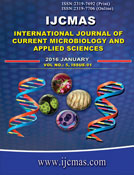


 National Academy of Agricultural Sciences (NAAS)
National Academy of Agricultural Sciences (NAAS)

|
PRINT ISSN : 2319-7692
Online ISSN : 2319-7706 Issues : 12 per year Publisher : Excellent Publishers Email : editorijcmas@gmail.com / submit@ijcmas.com Editor-in-chief: Dr.M.Prakash Index Copernicus ICV 2018: 95.39 NAAS RATING 2020: 5.38 |
Farmers have used excessive synthetic fertilizers, pesticides, herbicides, high yielding varieties of seeds, excessive irrigation with groundwater, intensive use of non-renewable energy resources to meet the growing food demand. There is no doubt that modern agricultural practice fulfill the food requirement of the country, but this has resulted in various environmental problems e.g. contamination of surface and groundwater with fertilizers & pesticides , food grain contamination with pesticides, lowering of ground water table, depletion of soil nutrients, loss of biodiversity and deforestation etc. In view of the growing negative consequences of modern agriculture there is growing demand to promote sustainable agriculture . The FAO defines sustainable agriculture as that which conserves land, water and plant and animal genetic resources, does not degrade the environment and is economically viable and socially acceptable. Sustainable Agriculture is a type of agriculture or farming which avoids the use of chemical fertilizers, herbicides, pesticides, and livestock feed additives. This system of farming rely on crop rotation, mix cropping system instead of monoculture, crop residues application, animal manures, legumes, green manure, and biofertilizers, mechanical cultivation and manual control of weeds etc. Vermicomposting can play a very important role in sustainable agriculture . It is a process by which worms are used to convert organic materials (usually wastes) into a humus-like material known as vermicompost. Organically grown products are free from harmful chemicals, artificial flavors and preservatives and they are more nutritious, delicious, tasty and healthy
 |
 |
 |
 |
 |